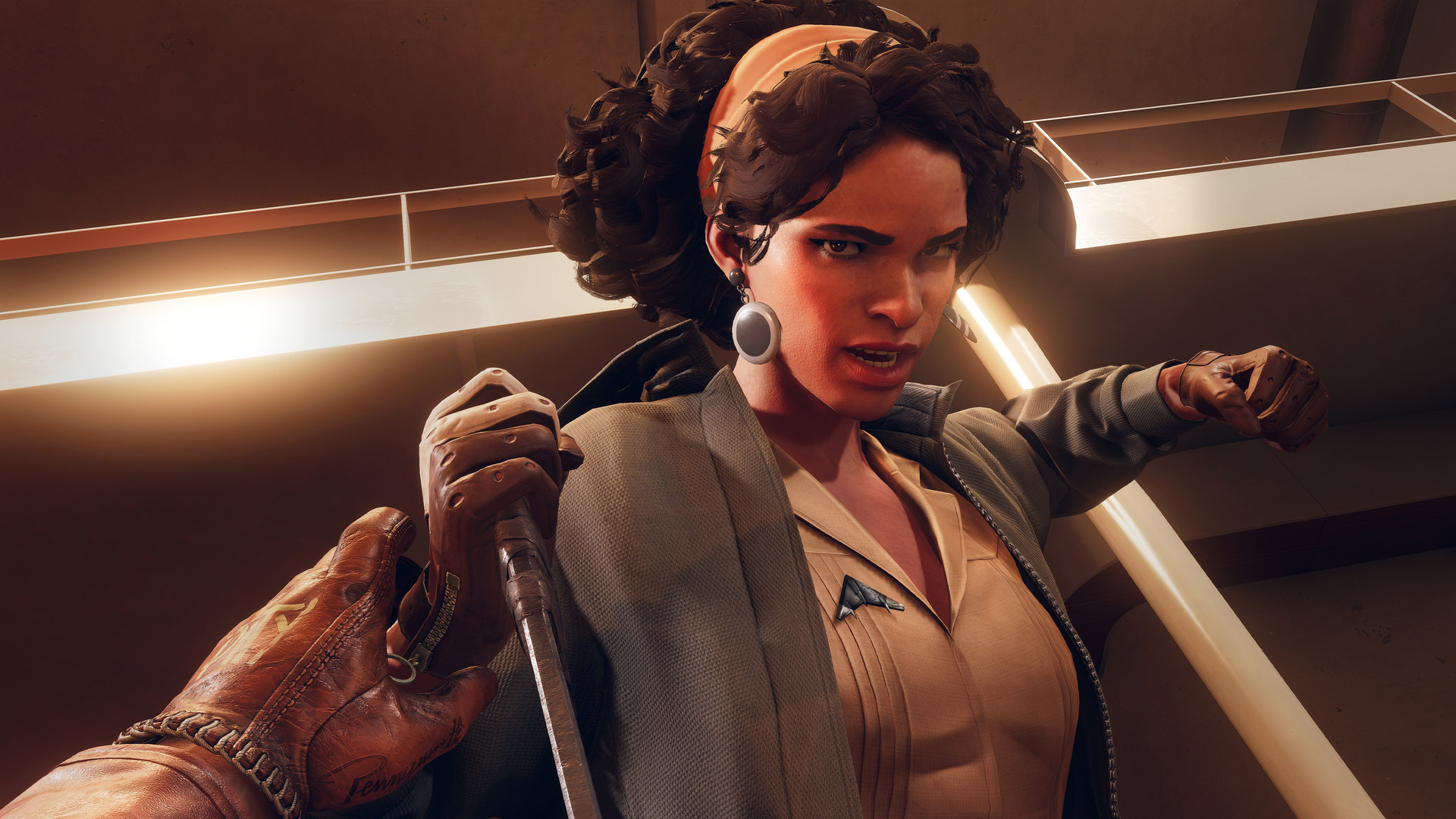Our Verdict
A thoughtful response to Dishonored that makes for an entertaining stealth shooter in its own right, but it's the multiplayer invasions that make Deathloop sing.
PC Gamer's got your back
What is it? An immersive sim, much like Dishonored, but this time set in a time loop.
Expect to pay $60/£50
Release date September 14, 2021
Developer Arkane Studios
Publisher Bethesda Softworks
Reviewed on RTX 3080Ti, 32GB RAM, Ryzen 7 3700X
Multiplayer? You can invade someone else's game, and be invaded in turn.
Link Official site
Arkane Studios is calling me out. It knows how I played Dishonored 2—my habit of quickloading away any mistake in pursuit of a perfect stealth playthrough. And given that almost 30% of Steam players have the Ghostly achievement for finishing a mission without ever being spotted, I suspect I'm not alone. Despite having a suite of tools for dealing with messy situations, we ignored them in favour of the most OP button on our keyboard: F9. With Deathloop, Arkane is removing the crutch. Quicksave is gone.
Deathloop is all about what happens when things don't go to plan; about panic and improvisation; about learning from a mistake, and taking those lessons forward. Trapped in a time loop, it doesn't matter if you botch your way through combat encounter after combat encounter—it doesn't even matter if you die and get kicked back to the beginning of the day. All that matters is that, in doing so, you gained some information that will help you the next time around.
Information is your primary objective in Deathloop—it's how you find and kill the Visionaries that act as the bosses of the island. There are eight in total, and your job as the amnesiac Colt Vahn is to take them all out in a single day in order to break the loop. Your problem is that your day is split into four chunks—morning, noon, afternoon and evening—and you can only visit one of the island's four areas during each period. The Visionaries only appear in certain locations at certain times of the day, and at first it doesn't seem possible to kill them all before the loop resets and your work is undone.
As you dig into the lives of your hit list, though, you'll uncover new ways to manipulate them. This is the bulk of the game, and your progress is tracked and updated as each new lead is uncovered. Colt is one of only two people whose memory remains intact when the day loops, which means his targets' behaviour remains consistent, and thus repeatable. It's immensely satisfying as the pieces start falling into place—as you see the consequences of your actions, and start filling out your itinerary in preparation for that perfect day.
The process of gathering information doesn't just apply to your primary objective, either. It turns out that looping repetition leads to a more organic sense of discovery that suits the immersive sim genre well. Arkane's level design is filled with secrets—hidden routes and locked doors that hint at new approaches. In Dishonored, you were rewarded for patience and observation, for scouring through notes and diaries and searching in hidden corners. And you can do that in Deathloop, sure, but it also supports a more direct approach.
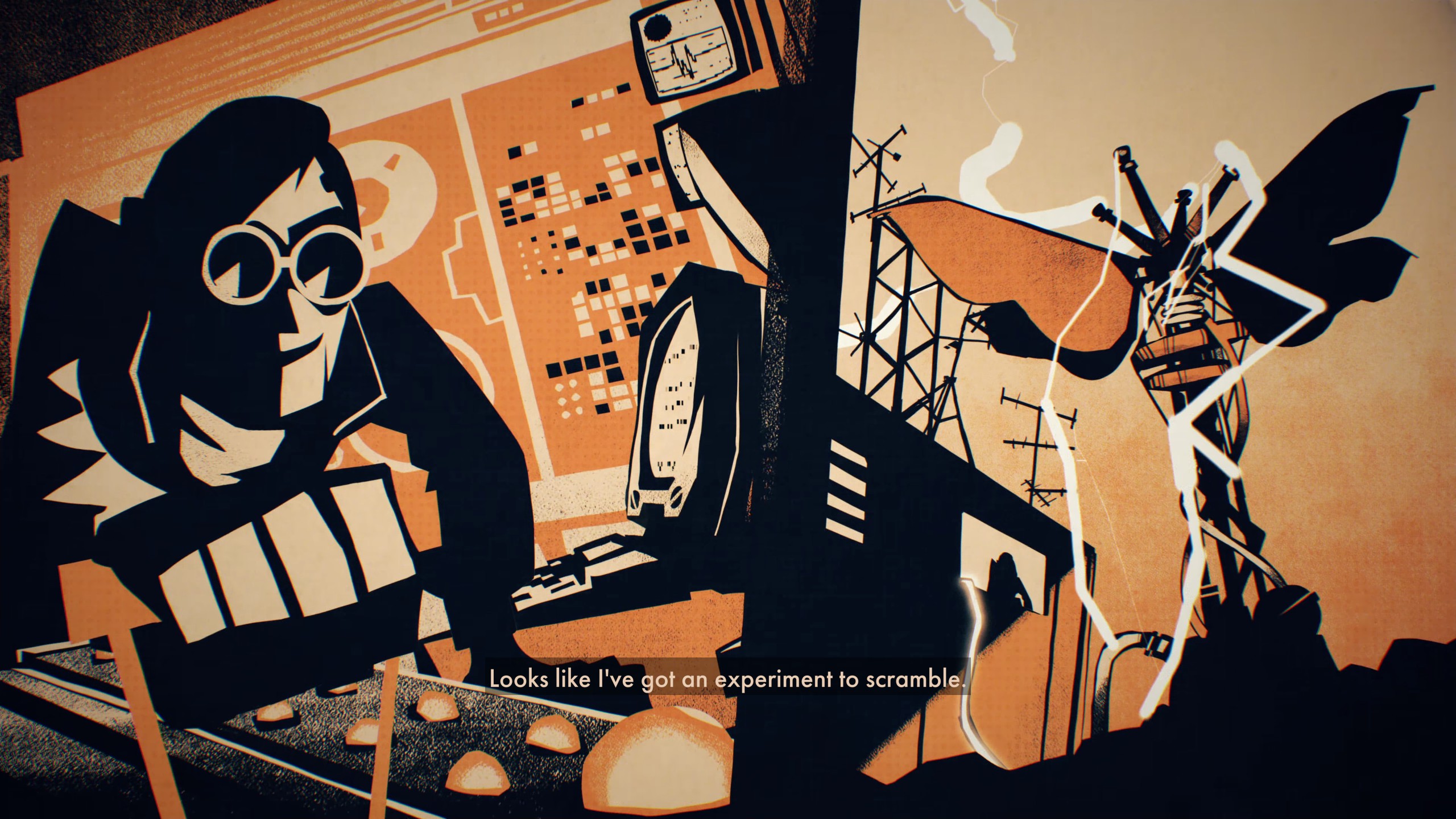
Party crasher
My first visit to Aleksis's party in the Updaam district of Blackreef was an embarrassing disaster. It's the most dangerous area in the game—all of the guests are packing heat—and so my botched stealth attempt became a protracted hunt, as I desperately attempted to run and hide, only to be caught anew. In the end I prevailed, but only after killing every single person in the building. With that done, though, an opportunity presented itself. I was free to explore in peace; to work backwards from inside the building, digging out its quieter areas, and discovering the routes that linked them. When I returned the next day, I was prepared. It still descended into chaos in the end, but did so on my own terms.
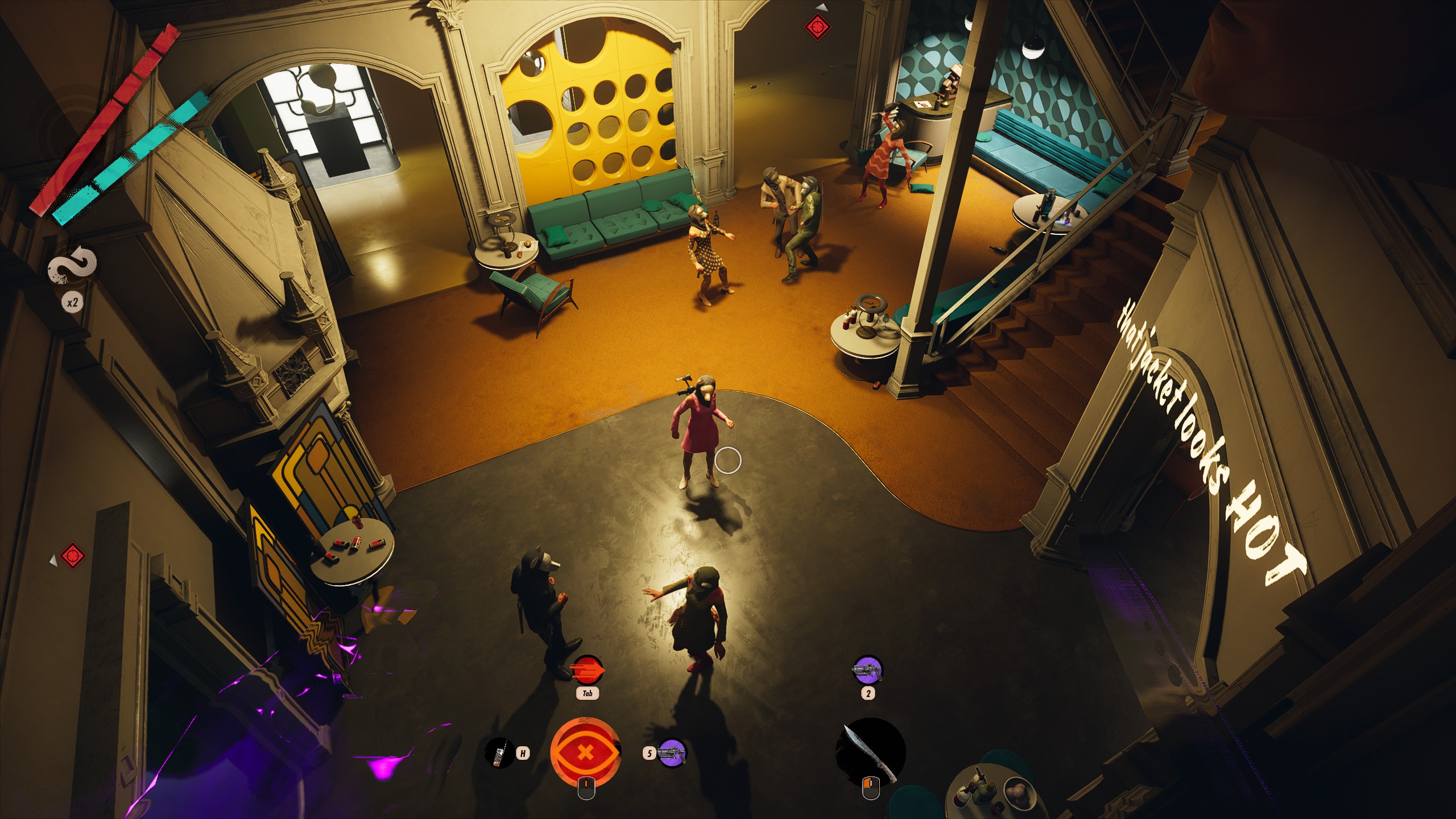
So far in this review, I've taken the stance that stealth is success, combat is failure. And I do think it's fair to call Deathloop a stealth game first-and-foremost. You hear it in the discordant audio cue that plays when you're spotted, and see it in the exclamation marks that appear over nearby Eternalists—Deathloop's name for the rank and file revellers that will attack you on sight. The game's DNA is so heavily entwined with Dishonored—from its powers, to its art style, to the very function of its UI—that I naturally gravitated towards stealth as my de facto approach.
Deathloop wants you to be pressured into slipping up; to cause a situation that you're forced to react to.
But even with that mindset, it's clear that Deathloop wants to nudge you away from obsessing over a flawless run. When you take out an Eternalist, they instantly fade into a sort of swirling ethereal mist that others can detect and react to. That means you can't spend hours neatly clearing out the map, hiding each body so that your handiwork is never detected. Deathloop wants you to be pressured into slipping up; to cause a situation that you're forced to react to. And then, when you do, it lets its weapons and powers feel fun to use, and, crucially, never punishes you for taking advantage of them.
At first, you start each day carrying only the basic weapons Colt has on him when he wakes up. Pretty early, though, you unlock the ability to infuse items—letting you carry them between loops. This is done by spending residuum, a resource harvested during missions or earned by sacrificing other, unwanted bits of gear. Infusion lets you permanently unlock better equipment for use. The best, of course, is held by the Visionaries themselves, who carry high-tier guns, trinkets and a signature slab—a power in the mould of Dishonored's supernatural abilities.
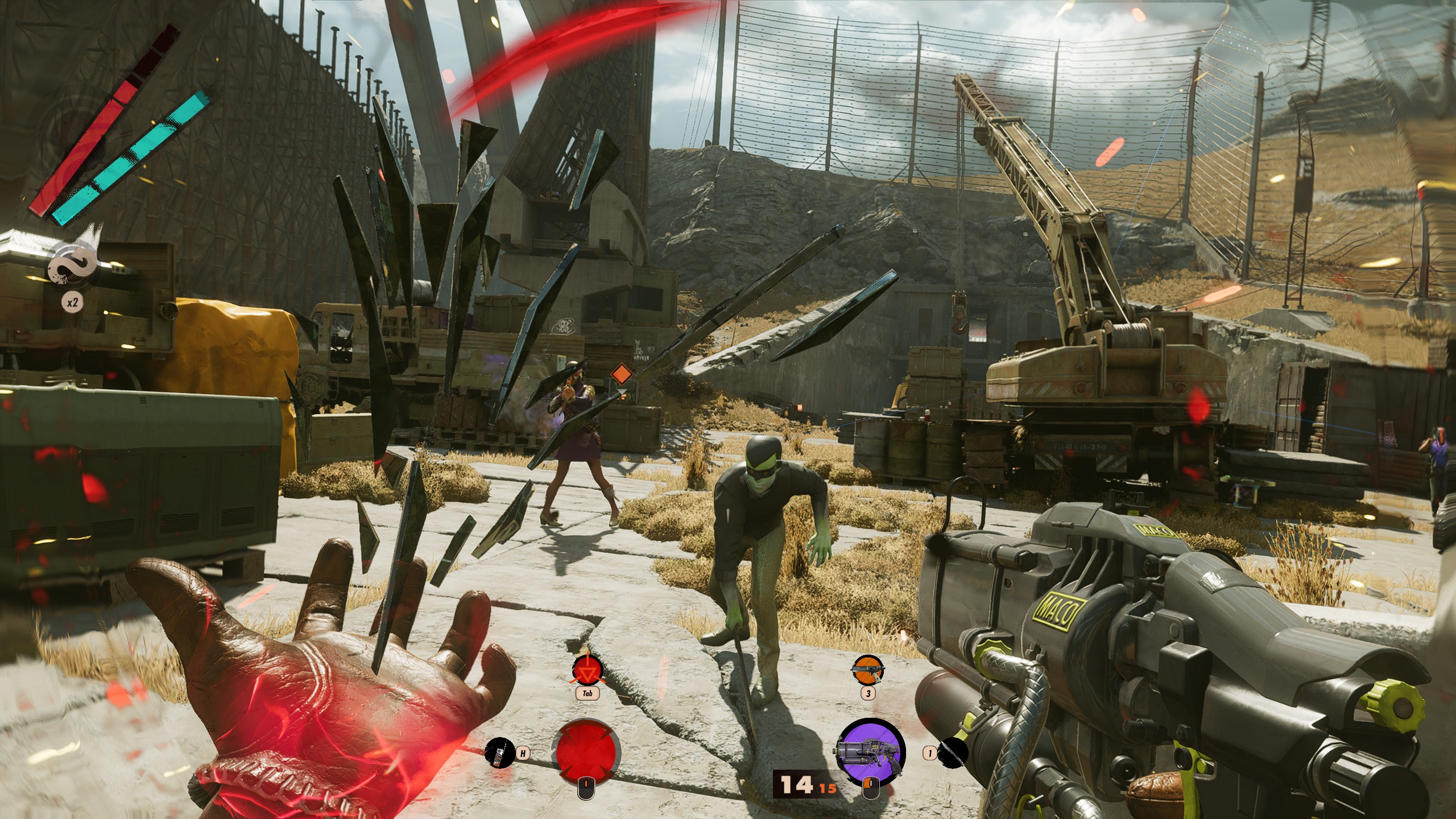
You're restricted in the number of weapons and slabs you can take on a mission, so if you see something you want in the field, you'll have to swap it with something you're already carrying. Dropped weapons and slabs are, logically enough, unavailable for the rest of the day. But thanks to the properties of infusion they'll be waiting for you at the start of the next loop.
Chaos theory
Another early power lets you respawn twice on the map without dying and thus resetting your loop. This means you can shrug off the occassional stupid mistake or botched encounter. If you can successfully return to your body without dying again, you can retrieve the residuum off your corpse and carry on as normal. At every stage, the game is telling you not to worry. Enjoy yourself. Don't sweat the mistakes.
You see, Arkane Studios is also calling out Arkane Studios; in particular Dishonored's central tension of giving the player a suite of tools for murder and mayhem, but using the story to admonish you for using them. There's no such thing as a non-lethal playthrough of Deathloop. Your basic stealth weapons are a machete and a nail gun. Colt's idea of a silent takedown is snapping an Eternalist's neck.
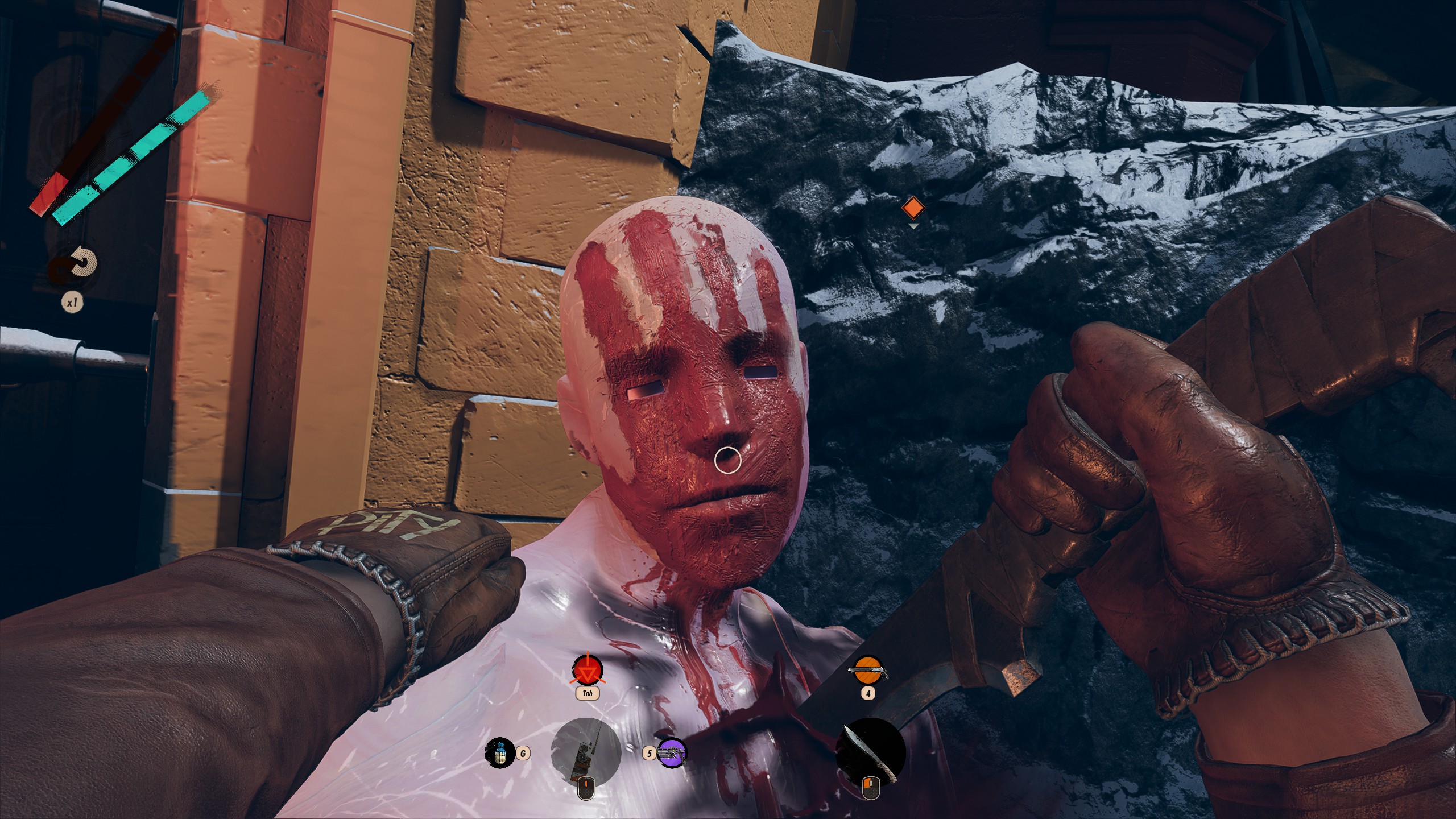
You should be able to hit smooth framerates at 1080p at reasonable settings on reasonable hardware. Even on a GeForce 1650 Super, you're looking at an average 43fps at the Ultra preset. This is a shooter mind, so dropping down to the Medium preset will net you a slicker 60fps.
It's a similar story at 1440p on more capable hardware: Deathloop looks good and runs well. Push the resolution up to 4K though, and it isn't quite as flawless. On a GeForce RTX 3080 you're only looking at 53fps using the Ultra settings. The good news is there are plenty of settings to play with to make sure you get the most out of your hardware.
It made sense for Dishonored to condemn killing—its story would have been worse if it didn't—but Deathloop's entire structure is built around the idea that everyone you murder will wake up none the wiser when the loop resets. So hey, here's an SMG with an intrinsic perk that recovers your health when you damage an enemy. Try pairing it with the Havoc slab, which makes you tougher and deadlier while it's active.
You can tell that Wolfenstein's MachineGames played a role in Deathloop's development. The guns are chunky, powerful and cacophonously loud. That said, the increased focus on violence and combat does accentuate some weaknesses in the AI. It can be easy to cheese combat encounters if you're of a mind to, using corners or doors to funnel enemies into a killzone. But between the guns, the tools, the more combat-focused slabs and the free respawns, it just feels more exciting to embrace the chaos and wade into the mess.
It's liberating to revel in destruction, and Colt clearly isn't the only one who feels this way. Throughout you'll find Eternalists enjoying the lack of consequences, vandalising the island and performing idiotic stunts over the course of the day. If death doesn't matter, why not shoot yourself out of a cannon?
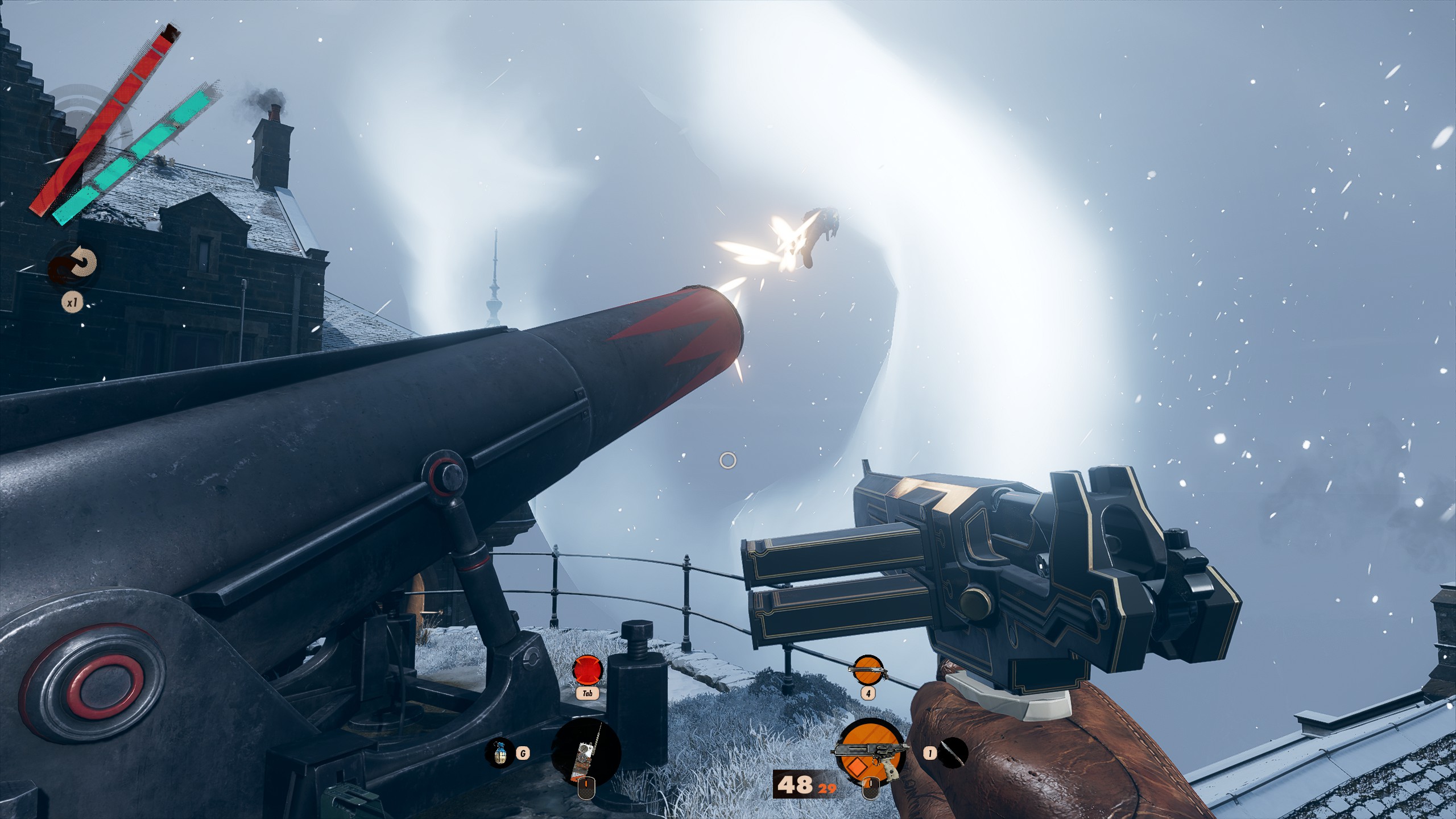
Throughout the game, there's a voice telling you that, actually, you love this. That's not me making some grand point about the duality of man or something: there's literally a voice—one coming from the other end of your radio each time you step into a new level. It belongs to Julianna, the other person on the island whose memory persists through each day. Her job is to protect the loop by hunting and killing Colt. And it's a task she revels in.
This cat-and-mouse relationship is the heart of Deathloop's story, and enhances the mystery of the loop, the island and Colt's past. As antagonistic as their conversations are, it's also clear Julianna enjoys their game. At one point she clarifies to Colt that she doesn't love watching him die, she simply loves killing him. There's a playfulness to her goading, but also an underlying frustration that makes uncovering the past that Colt can't remember all the more intriguing.
Invaders must die
Julianna's hunts are also the final piece of Deathloop's systemic puzzle, the thing that ties its various riffs on the immersive sim genre together. She can invade any level that contains a Visionary, and—if you play with online enabled, at least—will be controlled by another player. With an entire level as your playground, this leads to some incredibly tense encounters, but also plenty of slapstick shenanigans. Once, a player invaded me but didn't realise I'd already hacked some of the nearby turrets. They spawned, I heard a turret start to fire, and moments later the game told me Julianna had been killed.
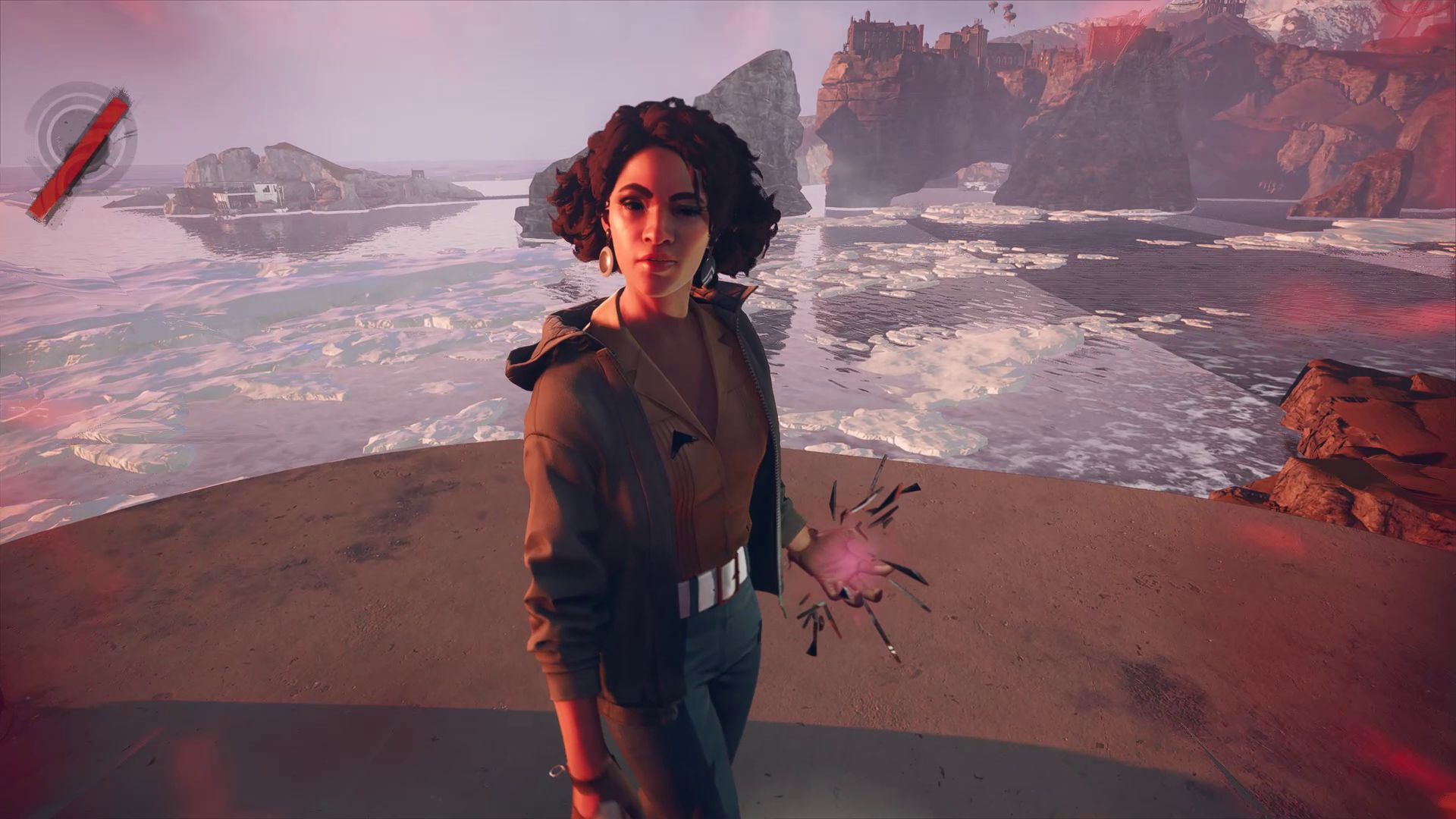
Colt is more heavily favoured in these encounters, because Julianna can't respawn when killed. Ultimately that imbalance is for the best. For Colt, the stakes are higher. Dying during the loop means losing access to any weapons or upgrades he gathered during that level—as well as any picked up earlier in the day that haven't yet been infused. As Julianna, meanwhile, your progression is tied to feats performed during your hunts. Even if you don't end Colt's day, a decent performance will still net you points towards unlocking more weapons, powers and upgrades.
Julianna's hunts are also the final piece of Deathloop's systemic puzzle, the thing that ties its various riffs on the immersive sim genre together.
Ultimately, most Julianna encounters are resolved in an open firefight, which is the key to why so much of Deathloop is constructed the way it is. Why can I only equip a handful of weapons and powers? Because building a loadout is more interesting if Julianna is a potential threat. Throughout the game, I made heavy use of Shift—Deathloop's version of Dishonored's Blink—and Nexus—Deathloop's version of Dishonored's Domino. Both were invaluable for reaching high-up spots where I could easily and silently take down groups of Eternalists.
But as I progressed, I started to favour slabs like Aether, which turns Colt invisible, or Havoc, which makes him tougher and more deadly. These were picks specifically designed to counterplay an invasion. One of Aether's upgrades stops it from draining your power as long as you're standing still. It's the perfect tool for turning hunter into hunted—I've caught more than a few invaders who decided to sprint across a section of the level, not realising I was near.
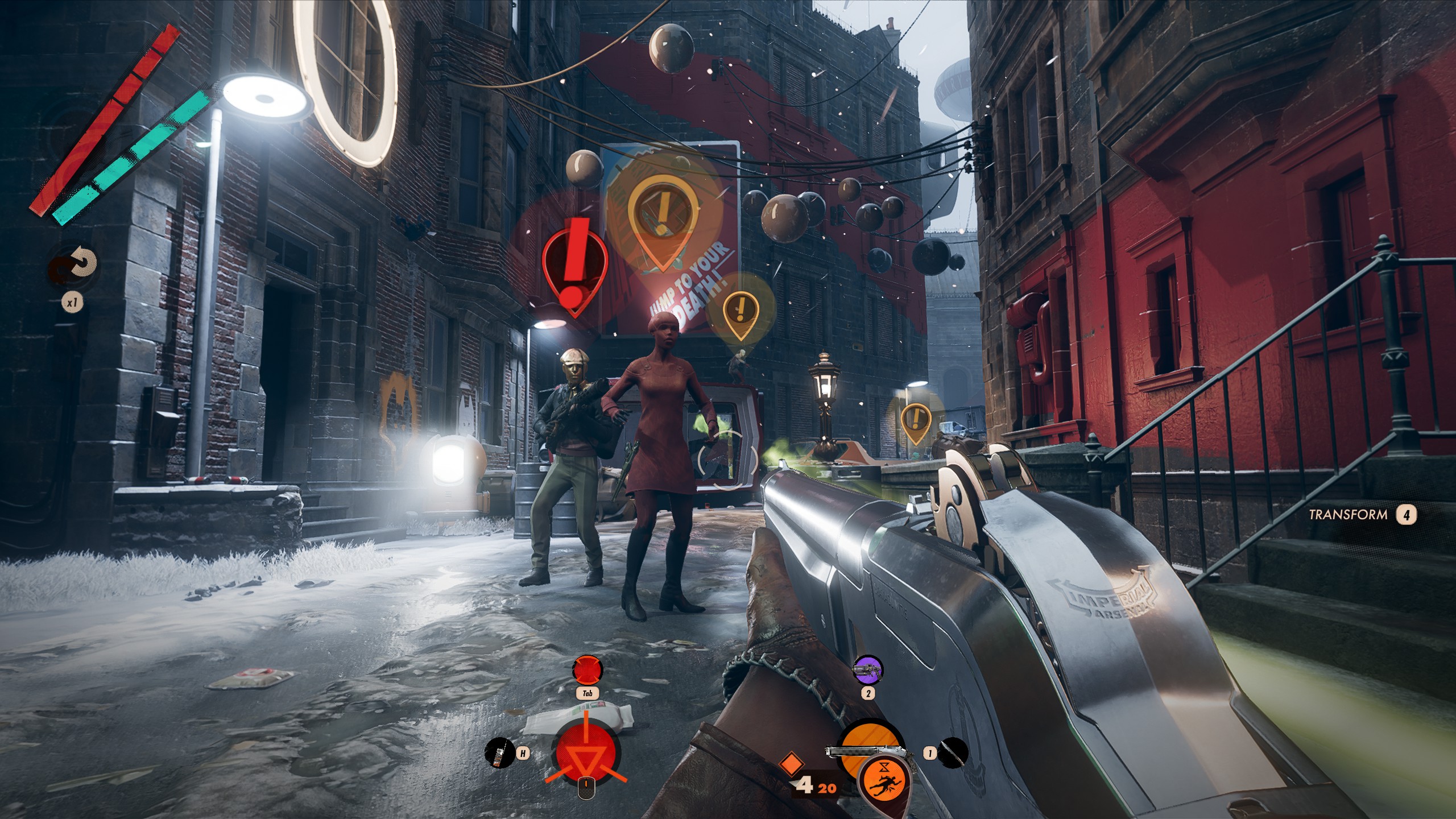
Certain gun perks make more sense with Julianna in mind too. At first I wasn't sure why I'd ever need a version of the Fourpounder—an absolute cannon of a handgun—that creates a gas cloud at the point of impact. It can already dispatch Eternalists with a single headshot—anything more seemed like overkill. But Julianna is tougher, and the damage-over-time causes players to panic. That can lead to funny interactions, like the time an invader shot at me through the flammable gas cloud, blowing themselves up in the process.
For the first few hours of Deathloop, I was more interested in it as Arkane's response to Dishonored—a series that I love. I was enjoying myself, and looking forward to uncovering the mysteries of the island, but was more intrigued by what Arkane was saying about the genre as a whole, and about the way people played its previous games. It wasn't until another player invaded my game that it all clicked together, and I started enjoying Deathloop on its own terms.
After around 25 hours, I may have completed the story, but I'm still not done: I want to complete the remaining puzzles to see what new weapons and upgrades are out there, and learn how they can help my fight against Julianna in the future. And I want to see how the hidden routes I discovered as Colt can help me be a better invader against other players less familiar with the levels. Colt might be determined to break the loop, but—at least for now—I'm not in any rush.
A thoughtful response to Dishonored that makes for an entertaining stealth shooter in its own right, but it's the multiplayer invasions that make Deathloop sing.

Phil has been writing for PC Gamer for nearly a decade, starting out as a freelance writer covering everything from free games to MMOs. He eventually joined full-time as a news writer, before moving to the magazine to review immersive sims, RPGs and Hitman games. Now he leads PC Gamer's UK team, but still sometimes finds the time to write about his ongoing obsessions with Destiny 2, GTA Online and Apex Legends. When he's not levelling up battle passes, he's checking out the latest tactics game or dipping back into Guild Wars 2. He's largely responsible for the whole Tub Geralt thing, but still isn't sorry.
